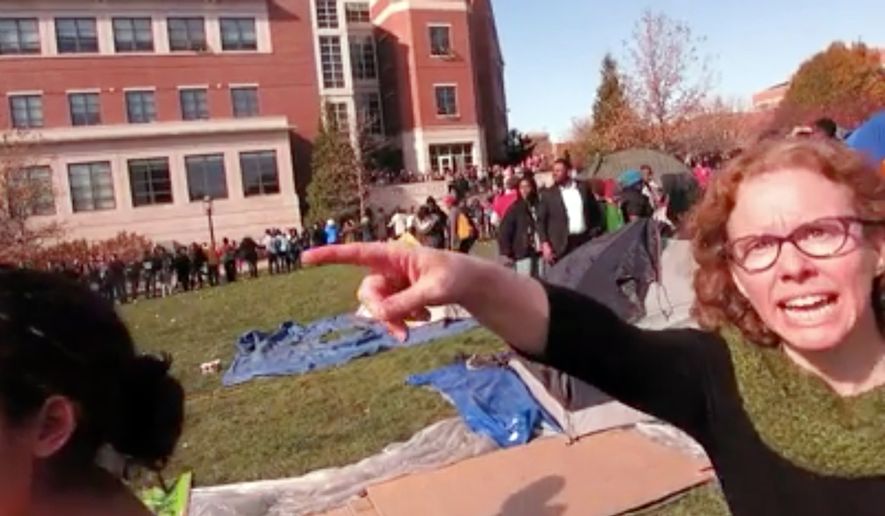College-level civics courses have been hijacked by a progressive ideology that emphasizes instruction in organizing political movements rather than understanding the American system of government and the Western tradition upon which it is built, according to a report published this week.
“Making Citizens: How American Universities Teach Civics,” a report published by the National Association of Scholars, examines the curricula at four universities and concludes that courses aimed at understanding America have largely been replaced by vocational classes on how to transform it.
“In practice this means that instead of teaching college students the foundations of law, liberty, and self-government, colleges teach students how to organize protests, occupy buildings, and stage demonstrations,” the study says. “These are indeed forms of ’civic engagement,’ but they are far from being a genuine substitute for learning how to be a full participant in our republic.”
The 525-page report includes case studies of four universities — Colorado State University, the University of Northern Colorado, the University of Wyoming and the University of Colorado-Boulder — where civics education ranges from less than stellar to nearly nonexistent.
The University of Colorado-Boulder, for instance, offers no specific mandatory curriculum. Instead, students fulfill graduation requirements by taking courses in 10 different areas of study — each of which includes hundreds of alternatives.
Boulder’s United States Context requirement can be completed by taking traditionally oriented civics courses such as American Political Thought or History of the United States to 1865. Or it can be fulfilled by taking Civic Engagement: Democracy as a Tool for Social Change.
Less than one-third of undergraduates at Boulder will take a class in traditional civics, the study estimates, and less than 10 percent will take a course in introductory American politics.
Although the report found 11 courses at Boulder that constituted traditional civics education, it identified 60 in a variety of disciplines that have explicit service-learning or civic engagement requirements.
“We surmise that still fewer students at CU-Boulder take two or more of the courses that comprise the traditional curriculum in civic literacy,” the report says. “The university’s policy of loose distribution requirements ensure that only a small fraction of CU-Boulder undergraduates receive a traditional civics education.”
Of the four universities examined, the University of Wyoming is the only one with something resembling a core curriculum — because of a mandate passed in 1925 by the state Legislature.
About half of the University of Wyoming undergraduates will take an introductory course on American government, and the other half will get out of the requirement by taking a multiple-choice exam.
“The requirement frames UW’s core civics education as an unpleasant obligation, to be avoided if possible — but at least the university still requires students to acquire a minimum of traditional civic knowledge,” the report says.
’Rules for Radicals’
John Carson, a regent at the University of Colorado, said a proper civics education is indispensable for informed participation in the American system of government.
“At its roots, civics goes back to the ancient Greeks and our whole civilization through the Middle Ages right to the founding,” Mr. Carson said. “If we’re not teaching American civics in a more modern sense and what the foundation of it is, then I think we’re compromising the very purpose of the university.”
The National Association of Scholars report details how the meaning of civics education has been transformed over the past several decades by disciples of the late Saul Alinsky, the community organizer known for his 1971 book, “Rules for Radicals.”
Instead of conferring an understanding of the U.S. Constitution, American history and Western civilization upon students, progressive activists have coaxed colleges and universities into defining civics education to mean community organizing, service learning and civic engagement toward progressive ends, the report says.
The view of civics education is endorsed by, among others, President Obama’s Department of Education, which in 2012 called on “the higher education community — its constituents and stakeholders — to embrace civic learning and democratic engagement as an undisputed educational priority for all of higher education, public and private, two-year and four-year.”
“The devil is in the details,” Peter Wood, president of the National Association of Scholars, said in a statement. “Now ’civic learning’ doesn’t mean what you would expect — straightforward things such as understanding the Bill of Rights, the three branches of government and the Electoral College. Instead, this New Civics is all about ’diversity,’ environmentalism, the LGBT movement, ’global’ citizenship, and other liberal causes.”
The report also shows that what happens in academia doesn’t stay in academia. Far from remaining isolated on America’s colleges and university campuses, the new civics has changed the very idea of what it means to be a citizen. That idea has expanded into a multibillion-dollar industry made up of federal and state bureaucracies, nonprofit organizations and professional advocacy groups.
“Civic engagement diverts at least $40 billion a year and 1.5 million hours of student labor toward progressive organizations,” David Randall, director of communications for the National Association of Scholars and author of the report, said in a statement. “In the meantime, colleges are failing to teach students how their government actually works.”
Ultimately, Mr. Carson said, America is imperiled by a citizenry that does not understand how its government functions or how to check its abuses of power.
“One of my favorite quotes is from President Reagan, who said, ’Freedom is never more than one generation away from extinction,’” Mr. Carson said. “His point is we have a responsibility to teach the next generation how freedom came about, why it’s important and what needs to be done to preserve it.”
• Bradford Richardson can be reached at brichardson@washingtontimes.com.




Please read our comment policy before commenting.